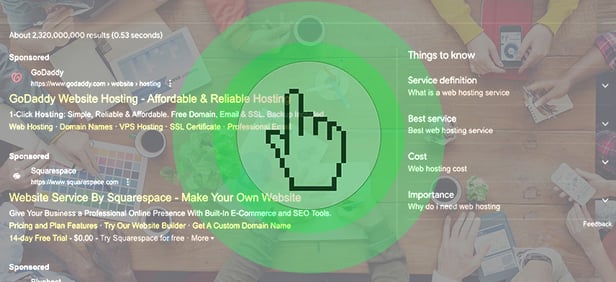It might seem like an odd question, but go with it – we’ve got an important point to make.
When was the last time you checked your PPC ads? Properly checked, by drilling down into your campaigns and reviewing the marketing collateral attached to each individual ad or campaign group?

We’re not asking to make you feel guilty: The overwhelming majority of CMOs are happy to delegate the minutiae of pay per click account management to a skilled specialist.
The tactical side of PPC management is in a constant state of flux and most of us simply do not have the time required to stay on top of things like the latest automated bidding strategies, the most efficient way to maximise your impression share or grow your quality score.
The average PPC interface is pretty confusing too. Unless you’re spending multiple hours per week dipping in and out of Google Ads, you will find it hard to drill down and look at things like your overall messaging, the engagement you’re fostering or the messaging that’s resonating with your target audience.
You Don’t Have Time To Micromanage Your PPC Accounts – And That’s OK
If we’re being completely honest, you have better things to do in the 8-10+ hours you’re at work. Strategic goal setting, team management, reporting and analysis eat up 90% of your time (source: EssenceMediacom), and that’s exactly how it should be.

But there is a very real risk to delegating your PPC marketing. Especially when it comes to your messaging. See, the actual ads you put in front of potential visitors represent an incredible opportunity. Most of the people who see them will be coming to your brand cold.
They might have googled something that speaks of intent to buy a product or service that you offer, or be browsing a web page that talks about something tangentially related to your offering. They may simply be unfortunate enough to have a job target that
It doesn’t really matter. The important thing to note is that these visitors are not coming to you specifically – using a branded search term or clicking through from a marketing email which means that they won’t have a pre-existing impression of your brand.
Your ad, then, represents a critical opportunity to tell your brand story and support wider (strategic) objectives around positioning and differentiation.
As Always, We’ll Start With An Analogy
Let’s pretend you’re running a commercial or business self storage site in the South East of England. You’re one of thirty sites in a twenty five mile radius, but you’ve invested a lot of money in smart automation software that allows visitors to come and go without having to sign it at a desk or
This is a significant advantage – and a key differentiator that will win you extra business, but it has to be communicated. Failure to do so will make you look like any other self storage site and squander the investment you’ve made in creating a more convenient experience.

The problem is that tacticians are rarely cognizant of these concerns. Your average PPC account manager may pay lip service to the idea of brand positioning but their primary focus will always be on massaging the KPIs used to measure their success.
Click through rate (or CTR) is one of the most important metrics that a tactician will look at, because it directly impacts your quality score and your total PPC traffic/clicks.
For those who don’t have time to brush up on Google Ads buzzwords, quality score is the metric Google use to work out how relevant and interesting a given ad will be to your audience.
It’s based on things like the synergy between your ad text and your target keywords, your expected click through rate or the quality of your landing page experience and it has a direct impact on
Clicks are more self-explanatory. But it’s definitely worth acknowledging that they are of paramount importance to most PPC account managers, because total PPC traffic is the metric most c-suite members fixate on.
From A Strategic Perspective, PPC KPIs Rarely Matter
Unfortunately, total traffic and quality score are not important to you. Clearly you’ll want your account to be healthy and functioning well, but prioritising click through rates over your broader strategic goals doesn’t make any real sense.

Why? Well, in simple terms, the best way to inflate your click through rate is to write click-bait headlines that are designed to compel clicks from browsers that by definition, probably aren’t part of your core target audience.
Pick up any guide to writing PPC headlines and you’ll read that you’re an idiot if you’re not including numbers and statistics (source: Adzooma), using language like “The Number One [X]” (source: (un)Common Logic) or using fear to your advantage (source: WordStream).
And all this advice is true – if your overall objective is to maximise clicks.
But we’re not interested in that. We already know that your prospective customers represent a minority or sub-set of the people that Google a given word or phrase. We also know that they’re being inundated by samey ads that tell near-identical stories about your competitors’ products or services.
All the hard work that you’ve done to establish your differentiators, your core value proposition and your overall positioning should come into play here.
Here, more than anywhere else, because you have an opportunity to clearly articulate your strategy in an arena that puts you in close proximity to the people you’re trying to outdo.
Going Against The Grain
You will lose clicks if you forsake PPC best practices to tell a more compelling story about your brand.

There’s no two ways about it.
Going back to our self storage example, the average person is less likely to click an ad that speaks to concerns that are only shared by small business owners with a surplus of stock. But the people that you actually want to attract will be infinitely more likely to click your ad. And that’s what we really care about.
They’ll also be more likely to remember your ad, and here again, we are going to deviate from the ruling zeitgeist: Many PPC managers will tell you that PPC search ads are used to drive traffic to your website, and that using them to build brand awareness is a fool’s exercise
We think the opposite. If you can write a headline that really stands out – a headline that makes your ideal customer think “huh, that’s exactly what I’m wrestling with”, it doesn’t really matter whether you ‘win the click’.
People have short memories, but we’re pretty good at remembering messaging that resonates with us. In fact, research from CXL suggests that consistent and resonant messaging is the best way to stay top of mind while B2B prospects negotiate the buying journey (source: CXL)

Given that the same research suggests that only 5% of buyers are actually ready to purchase when they start searching for solutions, leaving a lasting impression is probably far more important than getting them to visit a specific landing page – irrespective of how well crafted that landing page is.
Which is to say that, ultimately, our focus needs to be on using every opportunity to make the case for your business – in language that provokes thought and fosters engagement.
Writing Compelling Ad Headlines That Support Your Strategic Objectives
We’re going to focus on the specifics of writing Google search ads here, but the advice is definitely applicable to Google display, LinkedIn, X or Facebook ads too. Just ignore any conversation about character counts and focus on the general theme.

We’ll also add that this isn’t about throwing best practice guidelines in the bin: As noted before, you want to make sure that your ads and the wider ad account their situated in can perform well and grow properly.
As always, this is about breaking rules selectively – where there’s an opportunity to sacrifice a small amount of (in platform) performance for a significant gain in wider, strategic KPIs.
First on the chopping block? Generic headlines with universal appeal. You’ve already spent a significant amount of time profiling your ideal audience and working out what sort of language they respond to.

This is your opportunity to bring all that research to bear. Every appeal needs to be considered; the way you frame problems and phrase questions. If you’re speaking to people with a lot of domain knowledge, make sure you’re broadcasting the same.
If you know people are being peddled one-size-fits-all solutions that don’t fit the bill, now’s the time to say it.
And if your self storage facility is designed to meet the needs of small businesses in a 20 mile radius of city [x], just say that instead of opting for something generic like “Self Storage Luton”
Questions are a useful way of demonstrating an understanding of your audience’s pain points (source: Cantaloupe).
But don’t become overly reliant on them – as other, smarter marketers have pointed out before, they can be a double edged sword in the sense that they mask your proposition, and delay the promise of value which will alienate some savvy readers (source: MarketingExperiments).
Second on the chopping block: writing 14 ‘unique’ headlines, and avoiding the “pin to position” tool. Most PPC advertisers will parrot Google’s own rhetoric here; telling you that you need 14 headlines to give the Ads algorithm a decent shot finding the ‘right messaging’.

But the Ads algorithm will just mash different headline combinations together at random, which is massively problematic.
Imagine that you saw two ads next to each other, one reading
Best Weekly Rental Rates – Business Class Self Storage
And the other reading
Business Class Self Storage – Best Weekly Rental Rates
Same words, but switching the headline order is the difference between a legible ad that feels like it’s been written by a human and barely-parsable word vomit.
It’s also quite unlikely that you’ll be able to come up with 14 different but equally-good headlines that say something useful about your brand or solution. There’s a reason that seasoned copywriters spend weeks coming up with three of four phrases.
A shotgun approach does not suit, so make a calculated decision to ignore your Ad Strength metric and write a handful of killer headlines that’ll grab their attention – and don’t be shy about pinning them in a certain order.
Compelling storytelling rarely respects arbitrary restrictions.
Bring Your Knowledge To Bear
Ultimately, what we’re saying here is that you know your audience: You know what they respond to and what makes them tick. Make sure you’re employing all that hard-won insight because your PPC ads will probably be (some) people’s first exposure to your brand and you have a unique opportunity to tell a compelling story.

If you’re not sure whether your headlines fit the bill – or you worry that your PPC ads aren’t as good as they could be, get in touch. We’re not touting for work here; we genuinely enjoy helping people in the B2B space and will happily provide a free audit of your PPC accounts.
We’re also happy to chat through your positioning strategy and the best way to get eyeballs on your messaging. In our eyes, we’re better when we all try to build each other up and we know that a lot of B2B businesses have been running their ad accounts on autopilot.

